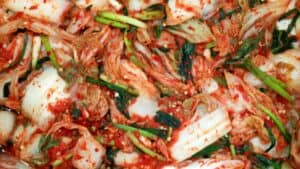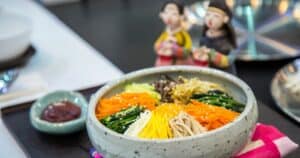Discover the heartwarming tradition behind why Koreans choose to enjoy a warm bowl of seaweed soup on their birthdays. This time-honored practice is a beautiful way to pay homage to mothers for the gift of life they have bestowed upon their children. But why exactly has seaweed soup become synonymous with birthdays in Korea?
To answer this question, we must delve into the roots of Korean culture and explore the ancient tradition of new mothers consuming seaweed soup for postpartum recovery. Uncover the historical significance of this practice, dating back to the Goryeo Dynasty, and learn why whales play a surprising role in its origin.
Additionally, we will delve into the nourishing properties of seaweed, as well as the common accompaniments and light seasoning that enhance this comforting dish.
The Tradition of Seaweed Soup: From Birthdays to Postpartum Recovery
Seaweed soup, also known as miyeok guk, is a traditional Korean dish that holds great cultural and historical significance. Koreans have various reasons for consuming this nutritious soup on special occasions, such as birthdays and after giving birth.
Postpartum Recovery:
- Korean women traditionally indulge in seaweed soup after childbirth to aid in postpartum recovery and promote the production of breast milk.
- It is believed that the nutrients present in the soup help women regain their strength and provide essential nutrients for both the mother and the newborn.
Honoring Mothers:
- Seaweed soup is also a symbol of honoring and celebrating mothers in Korean culture.
- The soup is prepared on birthdays to acknowledge the hard work and sacrifices made by mothers.
- Additionally, the dish pays tribute to Samsin Halmoni, a goddess believed to assist women during pregnancy and childbirth.
Nutritional Benefits:
- Seaweed is packed with vital nutrients, including iodine, calcium, and iron, making it an extremely healthy food choice.
- The low-calorie and low-fat nature of seaweed makes it a suitable option for maintaining a balanced diet.
- The high fiber content present in seaweed aids in digestion and overall gut health.
The Historical Significance: Seaweed Soup in the Goryeo Dynasty
Seaweed soup, or miyeok guk, holds great historical significance in the Goryeo Dynasty of Korea. It all began with the observation that whales would consume large amounts of seaweed after giving birth. This observation led people to believe that seaweed possessed beneficial properties for postpartum recovery.
The tradition of eating seaweed soup during birthday celebrations also started in the Goryeo Dynasty as a way to honor and pay tribute to mothers who gave birth to their children. The soup symbolizes and honors Samsin Halmoni, a goddess associated with pregnancy and childbirth.
Here are some key facts related to the historical significance of seaweed soup in the Goryeo Dynasty:
Whales and Seaweed Consumption: People in the Goryeo Dynasty noticed that whales would consume significant amounts of seaweed after giving birth. This observation led them to believe that seaweed had beneficial properties for postpartum recovery. This belief laid the foundation for the tradition of consuming seaweed soup to aid in recovery after giving birth.
Celebration of Motherhood: The tradition of eating seaweed soup during birthday celebrations in the Goryeo Dynasty originated as a way to honor and pay tribute to mothers who went through the arduous process of giving birth. By consuming the soup, people wished to show gratitude and celebrate the role of mothers in childbirth. The soup became a symbolic representation of Samsin Halmoni, the goddess associated with pregnancy and childbirth.
Nutritional Benefits: Seaweed itself is highly nutritious, containing various vitamins and minerals, such as calcium and iodine. These nutrients are essential for maintaining good health, especially for growing children, mothers, and lactating women. The consumption of seaweed soup during birthdays served not only as a celebration but also as a way to provide valuable nutrients to those in need.
The Surprising Role of Whales in the Origin of Seaweed Soup
Seaweed soup, also known as miyeok guk, has a fascinating connection to whales. Back during the Goryeo Dynasty in Korea, people noticed an interesting behavior among whales – they would consume large quantities of seaweed after giving birth. This observation led to the belief that seaweed had beneficial properties for postpartum recovery, and thus, the tradition of eating seaweed soup after giving birth was born.
But it doesn’t stop there. The tradition of eating seaweed soup evolved further and became intertwined with birthday celebrations. In the Goryeo Dynasty, it became a way to honor and pay tribute to the mothers who gave birth to their children. By consuming seaweed soup, people symbolically honored Samsin Halmoni, a goddess associated with pregnancy and childbirth. Thus, seaweed soup became an integral part of birthday celebrations, especially for mothers.
The role of whales in all this is surprising yet significant. The practice of whales consuming seaweed after giving birth caught people’s attention and sparked the belief in the beneficial properties of seaweed for postpartum recovery. Since whales are known to be strong and healthy creatures, it made sense to draw a connection between their diet and the nourishing properties of seaweed. This connection ultimately led to the development of the cultural tradition of seaweed soup.
It’s worth noting that seaweed itself is highly nutritious. It is packed with vitamins and minerals like calcium and iodine, making it a valuable addition to one’s diet. It is particularly beneficial for growing children, mothers, and lactating women. The consumption of seaweed soup after giving birth is believed to have originated in the Goryeo Dynasty and has been passed down through generations as a means of promoting postpartum recovery and overall health.
The Nutrient-Rich Benefits of Seaweed Soup
Seaweed soup, also known as miyeok guk, is a traditional Korean dish that is highly nutritious and offers numerous health benefits. This article will explore the nutrient-rich benefits of seaweed soup and why it is commonly consumed on birthdays in Korean culture.
Rich in Vitamins and Minerals:
- Seaweed is an excellent source of vitamins and minerals such as calcium, potassium, vitamin C, folate, beta carotene, and iodine.
- These nutrients are essential for maintaining good health, supporting growth, and preventing chronic diseases.
Supports Thyroid Function:
- Seaweed is particularly rich in iodine, which plays a crucial role in thyroid function.
- The thyroid gland releases hormones that regulate growth, energy production, reproduction, and cell repair.
- Consuming seaweed soup can help ensure adequate iodine intake and support optimal thyroid function.
Contains Antioxidants:
- Seaweed contains various antioxidants, including vitamins A, C, and E, as well as protective pigments.
- These antioxidants help protect the body from damage caused by free radicals, reducing the risk of chronic diseases.
Supports Gut Health:
- The fiber content in seaweed helps promote a healthy digestive system.
- It aids in preventing constipation and ensuring regular bowel movements.
- Additionally, seaweed may have positive effects on gut health, although further research is needed to fully understand its mechanisms.
Supports Heart Health:
- Seaweed is a good source of soluble fiber and contains beneficial long-chain omega-3 fatty acids.
- Both of these nutrients are associated with heart health benefits.
- Consuming seaweed soup may help reduce blood pressure, prevent blood clotting, and support overall cardiovascular health.
Common Accompaniments and Light Seasoning for Seaweed Soup
Seaweed soup is a popular dish in Korean cuisine, often enjoyed on birthdays and other special occasions. To enhance the flavor of this nutritious soup, there are several common accompaniments and light seasonings that can be added. Let’s take a closer look at some of these options:
Sesame Oil: Adding a drizzle of sesame oil towards the end of the cooking process can bring a rich and nutty flavor to the soup. This aromatic oil enhances the overall taste and adds a delightful depth to the dish.
Soy Sauce: A staple seasoning in Korean cuisine, soy sauce is commonly used in seaweed soup. It provides a savory and umami flavor, adding a deliciously salty note. Adjust the amount of soy sauce based on your preference for saltiness.
Salt: Simple yet effective, salt is a basic seasoning that helps enhance the flavors of the soup. Add salt to taste, allowing you to tailor the level of saltiness according to your liking.
In addition to these seasonings, there are a few other ingredients that can elevate the flavor of seaweed soup:
Fish Sauce: For those who enjoy a deeper and slightly fishy taste, fish sauce can be added to the soup. Opt for a light fish sauce for a milder flavor that won’t overpower the delicate taste of the seaweed.
Beef or Chicken Broth: To create a richer and more flavorful base for the soup, you can use beef or chicken broth. These broths add depth and richness to the dish. You can either use store-bought broth or make your own from scratch.
Additional Ingredients: Seaweed soup can be customized with various additional ingredients such as minced beef, tofu, garlic, and green onions. These ingredients not only enhance the flavor but also provide additional texture to the soup, making it more satisfying.
Seaweed Soup Beyond Birthdays: Its Cultural Significance
Seaweed soup, also known as miyeok guk, goes beyond being just a birthday dish in Korean culture. Its cultural significance can be seen in various aspects:
Postpartum Recovery and Breastfeeding: Seaweed soup is commonly served to women who have recently given birth. It is believed to aid in postpartum recovery and promote the production of breast milk. The soup’s nutritional properties, including minerals and vitamins, make it beneficial for new mothers.
Honoring Mothers and Samsin Halmoni: Eating seaweed soup on birthdays is a tradition that honors mothers and appreciates the nourishing qualities of seaweed. The soup is associated with Samsin Halmoni, a goddess related to pregnancy and childbirth. It symbolizes respect for mothers and their vital role.
Nutritional Benefits: Seaweed is highly nutritious, containing essential nutrients like calcium and iodine. It is considered particularly beneficial for growing children, lactating women, and mothers. The consumption of seaweed soup is a way to ensure a healthy and balanced diet.
Historical Significance: The practice of eating seaweed soup on birthdays dates back to the Goryeo Dynasty in Korea. It originated as a means to pay tribute to mothers who gave birth to their children. Additionally, observations of whales consuming large amounts of seaweed after giving birth contributed to the belief in its postpartum recovery properties.
Exploring the Heartwarming Connection between Seaweed Soup and the Celebration of Life in Korea
Seaweed soup, known as miyeok guk, holds a heartwarming connection to the celebration of life in Korea. This traditional Korean dish carries cultural significance that goes beyond just being a birthday dish. Let’s explore the reasons why seaweed soup is a significant part of Korean culture and how it symbolizes the celebration of life.
First and foremost, seaweed soup is an essential part of birthday celebrations in Korea. This tradition dates back to the Goryeo dynasty and is a way to honor and pay tribute to the mothers who gave birth to their children. By serving seaweed soup on birthdays, Koreans express their gratitude and respect for the role of mothers in bringing life into the world. It serves as a reminder of the love and care that mothers provide.
Additionally, seaweed soup is served to women who have just given birth, as it is believed to aid in postpartum recovery and promote milk production. This dish holds special importance in celebrating the beginning of a new life and supporting the mother’s physical well-being during this crucial time. By nourishing the mother, seaweed soup symbolizes the continuation of life and the cycle of birth and growth.
Aside from its symbolic meaning, seaweed soup also offers numerous nutritional benefits. Seaweed is rich in vitamins and minerals, such as calcium and iodine, which are essential for overall health. It is particularly beneficial for growing children, mothers, and lactating women. By incorporating seaweed into this traditional soup, Koreans recognize the importance of a nutritious diet in maintaining a healthy and fulfilling life.





